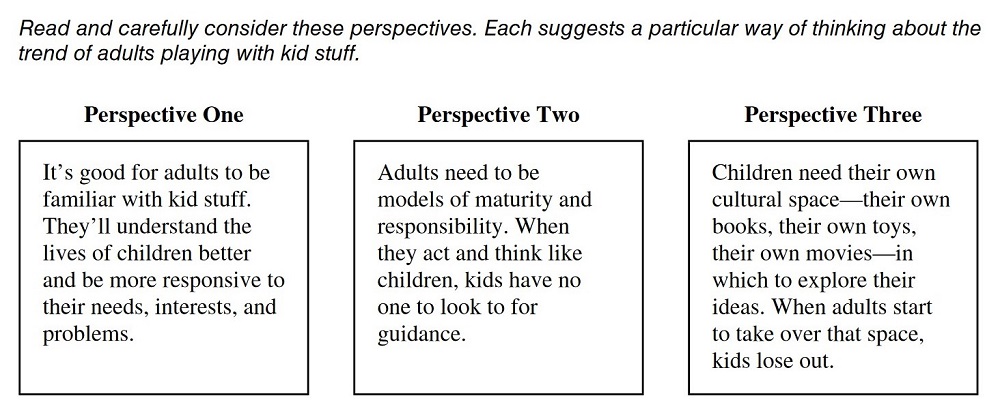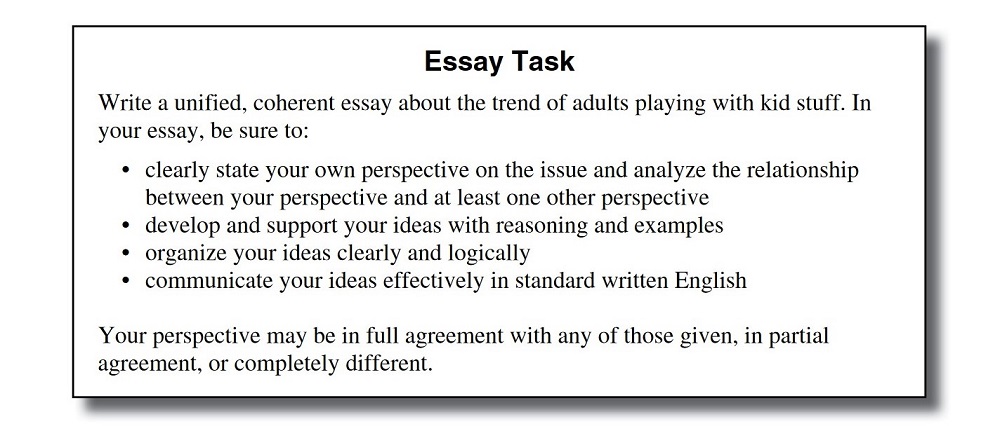
This prep guide will arm you with tips and strategies to ace the ACT Writing Test and explain the scoring methodology. The ACT Writing Test is an optional fifth and final section of the ACT college admissions exam. Students are allotted 40-minutes to write an argumentation-style essay based off of a controversial topic and 3 different points of views. The ACT Writing Test differs from the other portions of the ACT in three important ways:
- It is optional. Different postsecondary institutions have different needs. Some require an ACT writing test score to make acceptance and/or course placement decisions, while others do not. If you know that the postsecondary institutions to which you are applying do not require ACT writing scores, you can choose to opt out. Otherwise, it is highly recommended that you take the ACT Writing Test.
- It is a written test. Unlike the other four sections of the ACT, which are multiple-choice, the writing test requires you to produce a handwritten essay. Exceptions are available only for approved students with diagnosed disabilities.
- It is scored differently. Because the ACT Writing Test is optional, it is scored separately from the other sections and does not affect your ACT composite score (out of 36). Unlike multiple-choice questions, which have right (and wrong) answers, written essays are scored using a rubric. Each ACT writing test is graded by two different readers, who give the essay a score between 1 and 6 in four areas. The two readers’ scores are averaged, and the test receives a final score between 2 and 12.
This article provides an overview of the ACT Writing Test including tips and strategies plus sample essays for the 2020 Official ACT Practice Test. Click here to see all of our free ACT answer explanations including sample Writing Test essays.
Looking for more general ACT study advice? You might like our articles on How to Improve Your ACT Score and ACT Test Strategies. Need winning strategies for the other ACT sections? Check out all of the articles in our series of ACT strategy guides:
- ACT English Strategies
- ACT Math Strategies
- ACT Reading Strategies
- ACT Science Strategies
- ACT Writing Strategies (this article)
Format of the ACT Writing Test
You will have 40 minutes to complete the writing portion of the ACT. The test consists of one writing prompt that will describe a complex issue and present three different perspectives on that issue. You will then be asked to write an argumentative essay about that issue. Each test’s topic is different, but all students who take that test will write about the same topic.
The test always begins with a brief description of an issue of wide relevance to modern society, like this one from the free official 2020 practice test:

Then, the test presents a set of three possible perspectives on that issue.

Finally, the test presents students with their writing task. This task is always the same; the only portion of the prompt that the ACT changes for each test is the phrase that comes after “Write a unified, coherent essay about . . .”

Remember that you have only 40 minutes to familiarize yourself with the prompt, plan your essay, and write it out. It is recommended that you take no more than 10 minutes to plan your essay, so that you have the rest of the time to write and review it. The test booklet includes blank pages for you to use when planning your essay. These blank pages are not scored; only the lined pages on which you write your essay will be scored.
How the ACT Writing Test is Scored
Because the writing test does not have “right” or “wrong” answers, it is graded differently than the other parts of the ACT. Your essay will be scored by two trained readers (humans), who will compare your writing to the standards of the ACT Writing rubric. The readers will then score your essay on a scale of 1-6 in four different areas, called “domains.”
The four domains are:
- Ideas and Analysis,
- Development and Support,
- Organization, and
- Language Use and Conventions.
You will receive a total of five scores for the ACT Writing Test:
- a score from 2-12 in each of the four domains (the sum of the readers’ scores)
- a single overall score, also from 2-12, found by averaging the four domain scores
In the example below, you can see how the readers’ original scores translate to the final scores the student received.

Although it is not common, sometimes the readers’ scores differ by more than a point. In those cases, a third reader will evaluate the essay to resolve the discrepancy.
How to Get the Highest Domain Scores
Now, let’s take a closer look at the four domains to see what makes each one distinct, and what you should be focused on to excel in each.
- Ideas and Analysis: This domain concerns the ability to generate productive ideas and engage critically with multiple perspectives on the given issue:
- Your essay should have a clear and focused thesis.
- Use your thesis to consider at least two of the provided perspectives
- Don’t just state simple agreement or disagreement with perspectives, fully explore the strengths and weaknesses of each.
- Development and Support: This domain concerns the ability to discuss ideas, offer rationale, and bolster an argument.
- Use specific examples to illustrate larger ideas. Clearly explain why the examples are relevant.
- Each new idea you introduce should build on previous ideas, and deepen the support for your thesis.
- Organization: This domain concerns the ability to organize ideas with clarity and purpose.
- On a large scale, you should have an introduction (with thesis), several body paragraphs, and a conclusion.
- On a smaller scale, your body paragraphs should include topic sentences and move from more general arguments to the use of specific examples.
- All information about the same idea(s) should be grouped together.
- Language Use and Conventions: This domain concerns the ability to use written language to convey arguments with clarity.
- Use proper spelling and grammar; if you feel comfortable doing so, include sentences with a variety of punctuation.
- Try not to be repetitive with your word choices—but remember that spicing things up with too many “big words” can also sound artificial.
- When possible, vary your sentence length and structure.
- Your writing should be professional: don’t use slang or casual abbreviations.
The ACT Writing Test rubric offers a detailed description of what you need to do in each domain to earn each possible score (1-6). You should familiarize yourself with the rubric, and refer to it often when preparing to make sure that you are on track to receive your desired score.
Tips and Strategies for the ACT Writing Test
You’ve been practicing and preparing, and now it’s Test Day! Try to follow these easy steps to ensure maximum success:
1. Remember, the test is predictable
- Before you’ve even seen the test, you know what the format will look like and what you will be asked to do.
- Even the perspectives are (broadly) predictable: one will argue in favor of the topic, and one will argue against; the third is usually a mixed perspective or a different argument for or against.
2. Make a pro/con list for each perspective
- Once you have read the prompt, make a pro/con list for each perspective.
- What are the strengths of each argument? What are possible counterarguments?
- List some concrete examples you could use to support (or refute) each perspective?
3. Use your list to pick your perspective.
- You should pick the one for which you most easily came up with supporting evidence and examples.
- Remember, there is no “right” answer to pick and you will be graded only on the effectiveness of your argument.
- While you can come up with your own original perspective, unless you have a very clear idea, it is advisable to just choose one of the three provided.
4. Write your thesis and outline your essay.
- Now that you’ve chosen your perspective, write your thesis out as a complete sentence. Refer to it when you’re planning your essay.
- Start outlining: the first and last paragraphs will be your introduction and conclusion—easy!
- Now focus on the body paragraphs—plan for at least three.
- One possible outline: write one paragraph about each perspective. If you choose this outline, start with the paragraph in support of your chosen perspective, then move on to the other two, explaining why each is wrong.
- Another possible outline: write a few paragraphs, with different examples, showing multiple ways why your perspective is correct, and one paragraph explaining why the others are wrong. This is a good strategy if your thesis is supported by two of the perspectives.
5. Write your essay!
- Use the outline and your pro/con brainstorm to write your essay.
- Make sure your introduction leads to the thesis statement you already wrote.
- Use topic sentences in your body paragraphs and transitions when introducing examples and starting/ending paragraphs.
6. Re-read what you wrote.
- Correct any spelling and grammar mistakes.
- Double-check that you aren’t unintentionally repeating words, especially modifiers like really and very.
Congratulations—you’ve finished your essay! When you get your scores back, you can see what areas you did well in, and where, if any, you should focus for the next time.
Preparing for the ACT Writing Test
The ACT offers many suggestions to prepare for the writing test, but here are a few key strategies:
- Read and write often and in a diverse variety of styles. The more familiar you are with the process of reading something and writing a response to it, the easier it will be to do so in a test setting. Because of the unique format of the ACT Writing Test, it is recommended that you pay attention to current events and social issues (the Op-Ed pages of newspapers are a great resource).
- Replicate the testing experience. In addition to improving your writing skills, you should also make sure that you are familiar and comfortable with the format and structure of the ACT Writing Test. Take timed practice tests like those found on Piqosity to prepare for test day.
- Get feedback on your writing. Because your ACT essay will be scored by two outside readers, it is a good idea to have other people read and comment on your writing. You could ask your teachers or parents, or work with a tutor to improve the effectiveness of your writing. The score you receive on the ACT Writing Test is based on a rubric, which you should refer to often. Finally, it can be helpful to study sample essay answers, like those found below, to understand what successful (and less successful) essays look like.
View answer explanations and sample essay prompts to official ACT practice tests, and use Piqosity to practice the ACT Writing Test.



Leave A Comment